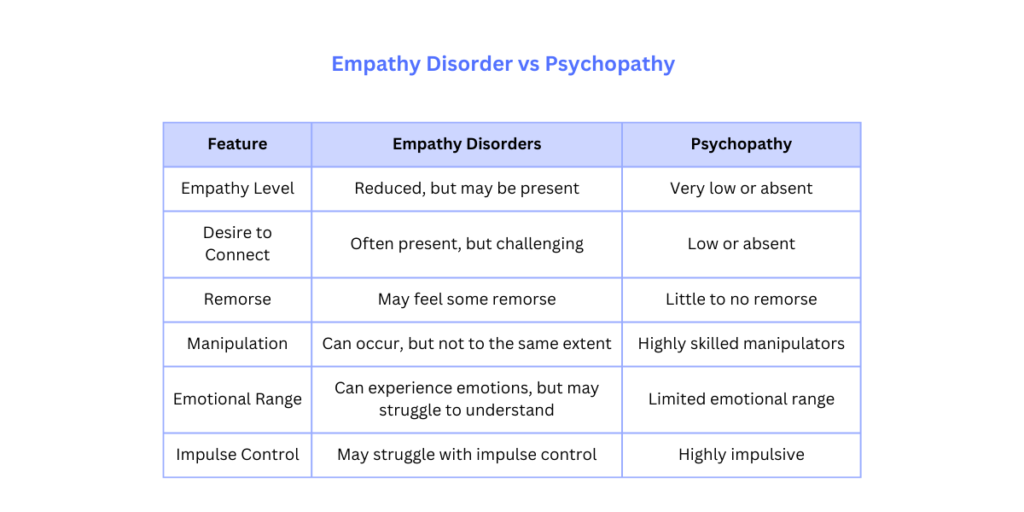Empathy is the ability to put oneself in another person’s shoes. This is the one single force that holds society together. We develop stronger bonds, relationships and connect with the people around us. But, what if you don’t feel empathy? Is this a sign of a mental health condition? It is crucial to know that these are variations on a spectrum. Even while those with empathy disorders may feel things more deeply themselves, they do not easily understand or respond to the feelings of others. This can result in difficulties in social interactions, relationships, and the world around them.
Empathy disorder can coexist with certain types of mental health conditions. Research conducted by the American Psychological Association has brought to light that a decline in empathy can lead to the rise of narcissism. Mental conditions such as narcissistic personality disorder, bipolar disorder, borderline personality disorder, and conditions on the autistic spectrum can coexist with empathy disorder.
Empathy is an ability that can be developed. Having low empathy does not mean no empathy forever.
In this series, We will explore what empathy disorders are, the causes, the symptoms, and the myths surrounding them. We will also talk about the need to be empathetic in a world where people are connected online and offline and also look at the extreme ends of the empathy scale.
Table of Contents
Understanding Empathy Disorders; The Causes and Symptoms

While some people can naturally excel at understanding others’ emotions, others may find it difficult to connect with the feelings of those around them. The difficulties can manifest in deeper mental health conditions where the variations are often referred to as empathy disorder. Lack of empathy is not always easy to detect. We will talk about a few signs that will help you identify If you or your loved one might not be empathetic.
What Causes Empathy Disorder?
The causes of a lack of empathy or empathy disorder may depend on various spectrums. We first need to understand what causes us to feel empathy in the first place. According to the National Library of Medicine, several interactive neurocognitive components contribute to the experience of empathy. Brain functions such as affective arousal, emotional understanding, and emotional regulation are responsible for the processing of emotional signals.
- A person diagnosed with a mental health disorder with similar symptoms may experience empathy disorder.
- The orbitofrontal cortex is another area of the brain that helps us react to another person’s feelings. Therefore, if any of these brain regions become damaged, a lack of empathy can occur causing empathy disorder.
- Environmental factors such as early experience of negligence, trauma, or difficult parenting can influence empathy disorder in adulthood.
Common Symptoms
- Victim Blaming
- Struggling to make new friends
- Difficulty in making emotional connection
- Discarding others perspective or opinion
- Feeling like others are too sensitive
- Lack of patience for people
- Possessing a strong sense of expectations
- Passing destructive feedbacks
- Quick to criticise and dismissive
Myths and Misconceptions about Empathy Disorders
Empathy disorder can be a complex topic to understand. There are often shrouded misconception that leads to stigma and misunderstanding for those who experience empathy disorder. Let’s debunk these common myths.

1. People with empathy disorder don’t feel emotions themselves.
This is a common myth that people assume. However, people with empathy disorder do feel intense emotions. The problem lies in recognizing and understanding others’ emotions.
2. People with empathy disorder are bad people.
Having an empathy disorder is not a moral failing. This is a variation in human experience and it does not make one a bad person. Many people with empathy disorder try hard to gain social skills to be able to connect with others.
3. Empathy disorder is untreatable.
While there is no single cure for the mental condition. Many strategies such as therapies and social skill training help people improve their ability to connect with others.
4. Only people with certain diagnoses can have empathy disorder.
Empathy disorders can manifest not just one specific diagnosis but, also Autism Spectrum Disorder (ASD) Antisocial personality disorder, etc. It is to be noted that not everyone with these disorders will have empathy disorder.
Living with an Empathy Disorder
Empathy disorders may pose a lot of difficulties in your social and personal relationships. If you are newly diagnosed or have always struggled with empathy, we have listed some of the things that you can follow to cope with empathy disorder.
Understanding Your Strengths
It is important to understand empathy disorder is not always a disadvantage. You may be logical, analytical, or even perfectionists who pay a lot of attention to details. These strengths can be leveraged to increase confidence and general well-being if identified and harnessed appropriately.
Building Your Toolkit
There are tools and strategies you can learn to improve your ability to connect with others. Social skills counseling can help teach you how to recognize feelings in other people, how to understand signals, and how to react correctly. Therapy like Cognitive Behavioral Therapy (CBT) may be useful in helping you change your negative thinking and find better ways of handling yourself in social situations. Mindfulness can be useful in making you more attentive to the feelings you and others have at present.
Building Relationships
Although some social interactions may be tiring, healthy and good relationships are not impossible. Concentrate on developing relationships with those who do not get easily irritated, are not quick to judge, and are willing to spend time and effort to explain themselves.
Remember, It’s a Journey
It is important to note that the acquisition of these skills is gradual and requires commitment. Understand that it is okay to take time, acknowledge the progress made, and do not hesitate to seek further help if required.
The Importance of Empathy in a Connected World
Empathy is the ability to understand and share the feelings of others. Even in the age of technological advancement and the constant use of social media, empathy is a valuable asset.
- Empathy fosters stronger relationships. When we accept and consider each other’s feelings, we create stronger bonds with the people around us.
- Empathy helps us to communicate in a way that is meaningful to the other party, which results in less misunderstanding and conflict.
- Empathy increases collaboration. When one can view things from another’s angle, it enhances unity and cooperation hence improving performance.
- Empathy is the basis of compassion. A world where we try to comprehend the difficulties of others is a world that is more compassionate and tolerant.
Exercise: How Empathetic Are You?
Ask yourself the following questions to determine how empathetic you are:
- Do you find it easy to identify emotions in others, both verbally and nonverbally (facial expressions, body language, tone of voice)?
- Can you understand the emotions behind someone’s words, even if they’re not explicitly stated?
- Do you tend to take things at face value, or do you consider the underlying emotions that might be present?
- Do you feel comfortable expressing your own emotions to others?
- Can you relate to the emotions of others, even if you haven’t experienced the same situation yourself?
- Do you find yourself getting emotionally affected by the situations of others (crying during a sad movie, feeling happy for a friend’s success)?
- Do you naturally try to comfort someone sad or upset?
- Can you adjust your communication style to better connect with someone depending on their emotional state?
- Do you find yourself offering help or support to others who are struggling?
- Do you try to see things from other people’s perspectives, even if you disagree with them?
Remember: There are no right or wrong answers here. This is simply a self-reflection
Wrapping Up
In conclusion, empathy disorder is not untreatable. Of course, there are difficulties, but it is essential to understand that empathy is not a gift that some people have, but a skill that can be trained. Therefore, it is crucial to encourage people to share their thoughts and feelings and to listen to others carefully to make the world a more tolerant place.
let’s apply this knowledge to help us move from knowing to caring and, ultimately, from caring to connecting, thereby creating a more empathetic and tolerant society.
Frequently Asked Questions
What is empathy disorder?
Empathy disorder is when an individual cannot understand another’s feelings, perspectives, situations, or opinions.
What causes empathy deficit disorder?
Empathy disorder can have various causing factors such as genetics, brain developmental function, and post-brain injury.
Which disorder is characterized by a lack of empathy and remorse?
Antisocial personality disorder (ASPD) is characterized by a lack of empathy and remorse.
What mental disorder causes a lack of empathy?
There is no single mental disorder that causes a lack of empathy, Several mental conditions such as ASPD, Narcissistic personality disorder, and Bipolar disorder may accompany a lack of empathy.
Can Empathy Disorders Improve Over Time?
Empathy disorder does not have a clearly defined diagnosis. Enhancing social skills with training, cognitive behavioral therapy, and mindfulness techniques can help improve the symptoms of a lack of empathy.
